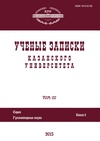ВЛИЯНИЕ РЕФЛЕКСИИ НА ПОЗНАВАТЕЛЬНЫЕ СОСТОЯНИЯ СТУДЕНТОВ ПРИ РЕШЕНИИ ТВОРЧЕСКИХ ЗАДАЧ
THE INFLUENCE OF REFLECTION ON THE COGNITIVE STATES STUDENTS WHILE SOLVING CREATIVE TASKS
Author(s): Leila A. Shayakhmetova, Albert Valentinovich ChernovSubject(s): Higher Education , Cognitive Psychology, Personality Psychology
Published by: Казанский (Приволжский) федеральный университет
Keywords: cognitive states; intellectual reflection; personal reflection; creative tasks; creativity;
Summary/Abstract: The cognitive states developing while solving verbal and non-verbal creative tasks and their reflective conditions were discussed. The main approaches to solving the problem of interrelation between creative thinking, cognitive states, and reflection were considered. Students of technical and humanitarian specialties participated in the experiment. Five questionnaires on the reflection ability, as well as Torrance’s test of creative thinking and the remote associates test were used to study the impact of reflection on the cognitive states while solving creative tasks. The differentiated influence of reflection was investigated by the method of factor analysis. We identified four types of reflection that describe its subject content and regulatory level: intellectual, communicative, personal adaptive and personal nonadaptive. It was found that the states of mental tension and “mental slowness” are more often experienced by students with an average level of personal reflection. Intellectual reflection, on the contrary, reduces the manifestation of these states. At the same time, the average level of intellectual reflection increases the frequency of experiencing a state of perplexity. Personal and intellectual reflection, as well as personal adaptive and personal non-adaptive types of reflection, form dichotomous pairs, thereby affecting the distribution of states in the opposite way. Moreover, the dependence of cognitive states display on reflection is non-linear. The results obtained confirm the impact of the studied types of reflection on the effectiveness while solving creative tasks.
Journal: Ученые записки Казанского университета. Серия Гуманитарные науки
- Issue Year: 161/2019
- Issue No: 5-6
- Page Range: 210-225
- Page Count: 16
- Language: Russian

